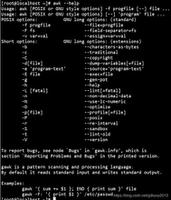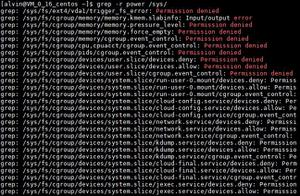在Linux上使用tar命令压缩和提取文件的最佳方法
您是否经常在Linux / Ubuntu上压缩和提取文件?您听说过.tar延期吗?然后,本文供您学习使用tar命令和示例来压缩和提取文件。
什么是.tar?
在计算中,tar是一种应用程序实用程序,用于将许多记录收集到一个存档文件中,最有可能称为tarball,以进行分发或备份功能。Tar最初是在Unix早期开发的,目的是将记录备份到计算机。基于磁带的存储。它曾经被正式规范化为POSIX标准的一部分。
要获取有关tar的更多信息,请使用以下命令-
$ tar --help
样本输出应如下所示–
Usage: tar [OPTION...] [FILE]...GNU 'tar' saves many files together into a single tape or disk archive, and can
restore individual files from the archive.
Examples:
tar -cf archive.tar foo bar # Create archive.tar from files foo and bar.
tar -tvf archive.tar # List all files in archive.tar verbosely.
tar -xf archive.tar # Extract all files from archive.tar.
Main operation mode:
-A, --catenate, --concatenate append tar files to an archive
-c, --create create a new archive
-d, --diff, --compare find differences between archive and file system
--delete delete from the archive (not on mag tapes!)
-r, --append append files to the end of an archive
-t, --list list the contents of an archive
--test-label test the archive volume label and exit
-u, --update only append files newer than copy in archive
-x, --extract, --get extract files from an archive
Operation modifiers:
--check-device check device numbers when creating incremental archives (default)
-g, --listed-incremental=FILE handle new GNU-format incremental backup
-G, --incremental handle old GNU-format incremental backup
--ignore-failed-read do not exit with nonzero on unreadable files
--level=NUMBER dump level for created listed-incremental archive
-n, --seek archive is seekable
--no-check-device do not check device numbers when creating incremental archives
--no-seek archive is not seekable
--occurrence[=NUMBER] process only the NUMBERth occurrence of each file
in the archive; this option is valid only in
conjunction with one of the subcommands --delete,
--diff, --extract or --list and when a list of
files is given either on the command line or via
the -T option; NUMBER defaults to 1
--sparse-version=MAJOR[.MINOR]
set version of the sparse format to use (implies--sparse)
-S, --sparse handle sparse files efficiently
.........................................................................................
创建一个.tar存档文件
要创建.tar存档文件,请使用以下命令-
$ tar cvf nhooo.tar /home/linux/12dec
在上面的命令中,它将12dec目录存档,该目录放置在/home/linux/12decnhooo.tar中。要验证上述命令,请使用以下命令–
$ ls
样本输出应如下所示–
12dec Documents flaskr Music static nhooo.tarcrawling Downloads intern Pictures templates VideosDesktop flask mozilla.pdf Public Templates
解压缩.tar存档文件
要解压缩.tar存档文件,请使用以下命令–
$ tar -xvf nhooo.tar
样本输出应如下所示–
home/linux/12dec/home/linux/12dec/final_url_weight.py
home/linux/12dec/tp_Crawled_few.txt
home/linux/12dec/Final_Url_Weight.csv
home/linux/12dec/extracting_keywors.py
home/linux/12dec/FINAL_URL_WEIGHT.db
home/linux/12dec/site_health_depth5.txt
home/linux/12dec/check_ageof_site.py
home/linux/12dec/final_url_weight_sqlite.py
创建一个.tar.gz存档文件
要创建.tar.gz存档文件,请使用以下命令-
$ tar czvf nhooo.tar.gz /home/linux/12dec
在上面的命令中,它将12dec目录归档,该目录位于/home/linux/12decnhooo.tar中。要验证上述命令,请使用以下命令–
$ ls
样本输出应如下所示–
12dec Documents flaskr Music static nhooo.tarcrawling Downloads intern Pictures templates nhooo.tar.gzDesktop flask mozilla.pdf Public Templates Videos
解压缩.tar.gz存档文件
要解压缩.tar.gz存档文件,请使用以下命令-
$ tar -xzvf nhooo.tar.gz
样本输出应如下所示–
home/linux/12dec/home/linux/12dec/final_url_weight.py
home/linux/12dec/tp_Crawled_few.txt
home/linux/12dec/Final_Url_Weight.csv
home/linux/12dec/extracting_keywors.py
home/linux/12dec/FINAL_URL_WEIGHT.db
home/linux/12dec/site_health_depth5.txt
home/linux/12dec/check_ageof_site.py
home/linux/12dec/final_url_weight_sqlite.py
创建一个.tar.bz2存档文件
要创建.tar.bz2存档文件,请使用以下命令-
$ tar cjvf nhooo.tar.bz2 /home/linux/12dec
在上面的命令中,它将12dec目录归档,该目录位于/home/linux/12decnhooo.tar中。要验证上述命令,请使用以下命令–
$ ls
样本输出应如下所示–
12dec Downloads mozilla.pdf static nhooo.tar.bz2crawling flask Music templates nhooo.tar.gzDesktop flaskr Pictures Templates Videos
Documents intern Public nhooo.tar
解压缩.tar.bz2存档文件
要解压缩.tar.gz存档文件,请使用以下命令-
$ tar -xjvf nhooo.tar.bz2
样本输出应如下所示–
home/linux/12dec/home/linux/12dec/final_url_weight.py
home/linux/12dec/tp_Crawled_few.txt
home/linux/12dec/Final_Url_Weight.csv
home/linux/12dec/extracting_keywors.py
home/linux/12dec/FINAL_URL_WEIGHT.db
home/linux/12dec/site_health_depth5.txt
home/linux/12dec/check_ageof_site.py
home/linux/12dec/final_url_weight_sqlite.py
在其他位置提取.tar文件
要在不同位置提取.tar文件,请使用以下命令-
$ tar -xvf nhooo.tar -C /home/linux/abc
在以上命令中,nhooo.tar存档文件在该/home/linux/abc/位置提取。样本输出应该是这样的–
home/linux/12dec/home/linux/12dec/final_url_weight.py
home/linux/12dec/tp_Crawled_few.txt
home/linux/12dec/Final_Url_Weight.csv
home/linux/12dec/extracting_keywors.py
home/linux/12dec/FINAL_URL_WEIGHT.db
home/linux/12dec/site_health_depth5.txt
home/linux/12dec/check_ageof_site.py
home/linux/12dec/final_url_weight_sqlite.py
要验证上述命令,请使用以下命令–
/abc/home/linux/12dec$ ls
样本输出应如下所示–
check_ageof_site.py FINAL_URL_WEIGHT.db site_health_depth5.txtextracting_keywors.py final_url_weight.py tp_Crawled_few.txt
Final_Url_Weight.csv final_url_weight_sqlite.py
在阅读完本文之后,您将能够了解如何在Linux上使用tar命令压缩和提取文件。在我们的下一篇文章中,我们将提出更多基于Linux的技巧。继续阅读!
以上是 在Linux上使用tar命令压缩和提取文件的最佳方法 的全部内容, 来源链接: utcz.com/z/327204.html







